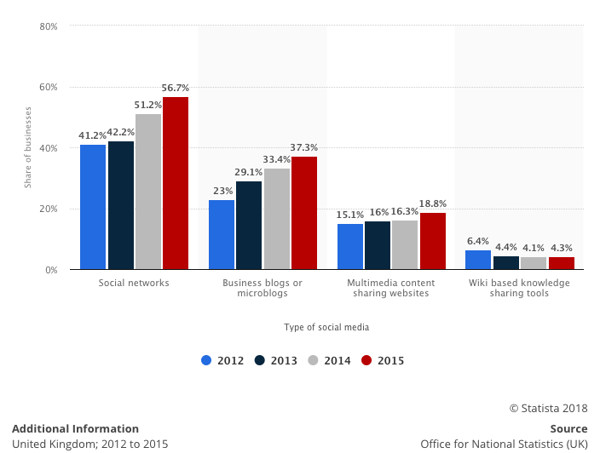If you are trying to build your businesses’ digital presence you may think social media is the way to go. While you’re not wrong, social media is merely the tip of the iceberg when it comes to audience engagement. The real results lie within content.
The advantages of social media
It’s not surprising that every man and his dog is on social media. More than 56 percent of UK businesses use it as part of their marketing campaigns. The process can be cheap, informal, instant and almost anyone can do it.
Thanks to channels like Facebook and Twitter, sharing your brand message is no longer a case of shoving it in front of your customers and hoping they like it. Now your audience can choose to engage with your brand and build a relationship. In fact, according to Hootsuite 41 percent of people want institutions to have a strong social media presence.
Social media is a brilliant starting point for any new businesses. Before spending a penny on a marketing campaign, we advise you set up your social channels and start building an audience. Having a positive social presence that customers actively engage with is something every business should endeavour to achieve. By regularly using social media you can:
- Have conversations with your customers in real time
- Respond to criticism and make valuable changes
- Keep a finger on the pulse of your audience
- Make announcements surrounding new products or services
- Curate content and share valuable insights
- Promote your brand
The advantages of content marketing
With so many businesses jumping on the Facebook bandwagon, how do you stand out and compete for your audience's attention?
The answer is content.
Content marketing takes these customer conversations one step further. While social media encourages interaction between consumer and seller, content marketing sets up your brand as not just a friend but as a trusted mentor.
Having a trove of valuable, useful content turns your brand into a source of information, one which your audience will look to when dealing with questions or pain points regarding your specific expertise.
Yet, according to the graph below, less than 38 percent of businesses are blogging. Even less are embracing multimedia content.

While we usually opt in to see a specific businesses social posts, a surge in Facebook and Twitter paid advertising has caused social media to begin to creep into that traditional, intrusive marketing spectrum. With ads sneaking into our newsfeed, people are dealing with the bombardment by using adblockers. This makes these marketing efforts redundant.
By contrast, content marketing is about creating blogs, videos and graphics that consumers actively seek out and find useful. There is no need to sneak into your audience’s eyeline, content marketing values practicality above promotion.
There is no greater turn off for the modern consumer than the feeling they are being sold to. Thankfully, content marketing generates more leads for less investment than other outbound techniques.
Hot content
Hotpads, a USA based estate agent, experienced exponential growth by embracing content marketing methods. By investing in professionally written, quality content the company managed to increase their traffic by 4,000 percent in just seven months.
While Hotpads most definitely had a social media presence as well, without a regular content plan the company would have had little to offer their audience. By writing blogs about the housing market, they became experts in their industry and customers flocked to them.
The downside to content marketing
Content marketing is economical, underutilised and above all - it really works. But, like anything effective, it’s not without its downsides.
While blogging is cheap compared to filming a television advert, content creation requires more than money. Quality content demands time, creativity and a certain level of skill.
Modern consumers are devouring content like never before. So, they expect a certain standard. Think about it: how many times have you opened a webpage only to close it again because it’s badly designed or poorly written?
Structure, design, tone of voice and poor research are all things that can let content down. While these are teachable skills, acquiring them can take time. Without the right training, you could invest hours into a piece of content that just doesn’t read well.
Where to invest
While you or your team may not be giving Ernest Hemingway a run for his money, everyone deserves to create great content. Hiring a content creation company may be the ideal solution for those without the patience or skills to make their own.
A good content creation agency will have professional writers on staff, some of which may have roots in journalism. Armed with your expertise and their knowhow, together you can create unique, valuable content that entices your audience and converts visitors into customers.
Social media on the other hand is a skill that can be picked up with time. While a successful social media campaign requires strategy and effort, there are hundreds of resources that can help you. Here are few of our favourites:
- Udemy, LinkedIn Learning, Futurelearn: Online learning resources can help you get to grips with the ins and outs of successful social media strategy.
- Hootsuite, Tweetdeck: Manage your social channels easily with these useful dashboards.
- Inbound.li: Easily curate content to share on your social channels.
Better together
Content and social are two sides of the same coin; if content is your news articles, then social is your ink, your paper, your cold looking soul handing out magazines outside Waterloo station. The two work together.
By all means, continue to use social media - it’s a revolutionary marketing tool. But, for the best results, you should use it to promote your own unique content. After all, what’s the use of a platform if you’ve got nothing to say?
 Posted by
Violet Myers
Posted by
Violet Myers





